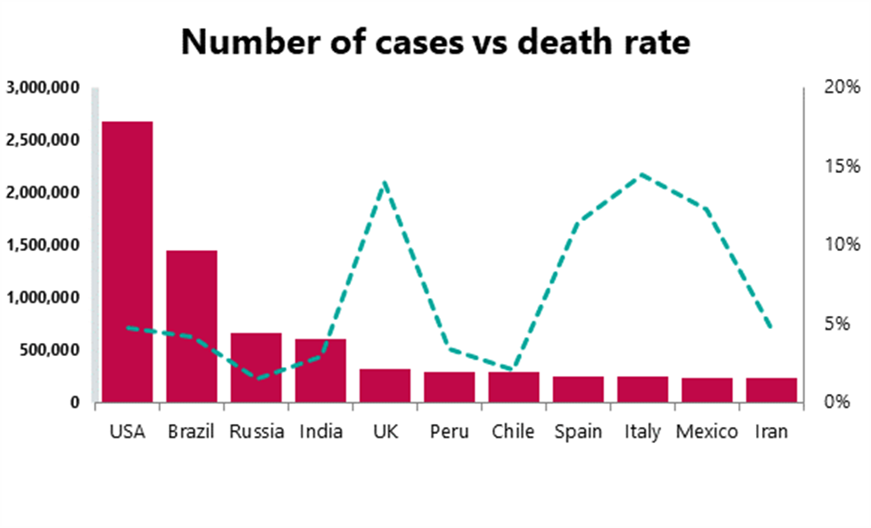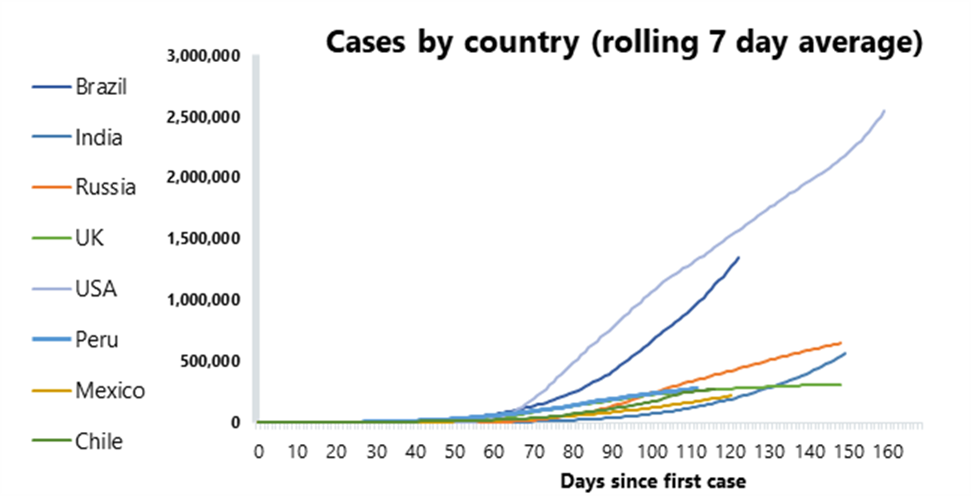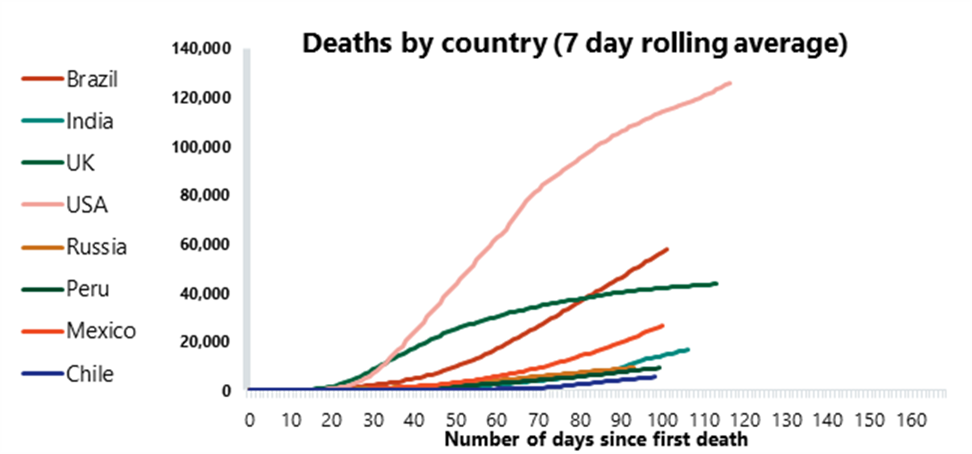Week ending 3 July
Key findings
- UK has been hardest hit out of all G7 nations in terms of excess deaths.
- Discussions are being made about the challenges of vaccine manufacturing and delivery around the world, including what country should get the vaccine first.
- Worldwide, there are concerns about potential disruptions in local food supply chains and nutritional quality, especially in low and middle-income countries
- Latin America continues to see a rise in cases and now accounts for 50% of the global daily death toll.
This week in the world
Global
- As the world faced two grim milestones this week, 500,000 deaths and more than 10 million confirmed cases, there is further concern about potential disruptions in local food supply chains. In this webinar a panel discusses the impact of COVID-19 on the global food supply and nutritional quality, especially in low and middle-income countries. The CGIAR have launched a coordinated research response into this issue. They have also launched a really useful policy response portal, which tracks policy changes in 26 countries and 9 response areas.
- Excess deaths: The Health Foundation, BBC News and Oxford University's Institute for New Economic Thinking have worked together to analyse COVID-19 deaths and excess deaths. It compared countries in three ways, and found that of the G7 nations the UK has been the hardest hit. Germany, Canada and Japan have seen comparatively fewer deaths.
Devolved Nations
Europe
Africa
- Protests in Johannesburg; Demonstrators in South Africa gathered last week to protest against ‘profiteering’. Organisers believe that the trial, part of one already underway in Britain of the vaccine developed at the University of Oxford , is ‘manipulating the vulnerable’ and that the people chosen as volunteers are from poorer backgrounds.
- Healthcare workers in Freetown, Sierra Leone were promised hazard pay for their work in, but this hasn’t come. Doctors have now gone on strike, citing misuse of funds (around 20% of SL’s coronavirus budget went to procuring 30 new SUVs and 230 motorbikes for the Emergency Operations Centre), a lack of compensation and protection for health workers.
North America
South America
Middle East
Asia
- Indonesia has granted tax incentives and deductions for domestic taxpayers and healthcare workers assigned to COVID-19 cases will not pay income tax on their salaries or bonuses.
Australia and Oceania
Spotlight on… How will the world pay for a vaccine?
During the Office of Health Economics 2020 Annual Lecture, and accompanying draft paper, they discuss the challenges in vaccine manufacturing and delivery to the world:
World leaders and international organisations are now trying to understand:
- how to tackle these development and manufacturing issues, and, given the billions of doses that will be needed,
- decide who should get vaccines first,
- How to raise enough money even to get to that stage.
The authors propose a Benefit Based Advance Market Commitment (BBAMC) as the best way to pay, as it is a commitment based on paying for value instead of cost. This works to incentivise the development of vaccines that provide higher levels of protection, not just the first ones to ‘cross the finish line’. But, this won’t be cheap, and low and middle income countries would need help from higher income countries to pay for vaccines.
International data
Below is the latest international comparison of COVID-19 data using WHO published figures. As mentioned before, country to country comparison has some limitations because of the variation in approach, data collection and testing.
Data from 03/07/2020
- Worldwide, there are 10,662,536 confirmed cases (an increase of 13.3% and 1,249,247 more cases) and 516,209 deaths (an increase of 7% and 33,479 more deaths) than last week. The previous weeks data saw a 12% increase in cases and 7% increase in deaths, which suggest that the worldwide cases and deaths are still continuing to rise at a steady rate.
- The number of UK cases accounts for 2.9% of world cases at 313,487 cases and 8.5% of world deaths due to coronavirus (43,906 deaths).
- The USA remains the country with the most cases and deaths in the world, accounting for 25.1% of world cases (2,671,220) and 24.8% of total deaths (127,858 deaths).
- WHO says the pandemic has not yet reached its peak in Central and South America, where Brazil has been the worst-hit so far. Brazil remains ranked 2nd in terms of number of cases with 1,448,753 cases, an increase of 21.9% since last week, and the second highest death toll in the world with 60,632 deaths, up by 12.6% since last week. Latin America now accounts for 50% of the average global daily deaths.
- Mexico has now overtaken Iran and is now ranked 10th in terms of number of cases (231,770 cases).
- The UK remains ranked 5th in terms of number of cases and remains the country with the highest death toll in Europe and third highest in the world with 43,906 deaths.
- Currently, England has 13 times more cases than Scotland (18,264 cases), 15 times more cases than Wales (15,815 cases) and 42 times more cases than Northern Ireland (5,768 cases) (PHE data).
| |
|
Cases
|
Deaths
|
Death rate
|
|
1
|
USA
|
2,671,220
|
127,858
|
4.8%
|
|
2
|
Brazil
|
1,448,753
|
60,632
|
4.2%
|
|
3
|
Russia
|
661,165
|
9,683
|
1.5%
|
|
4
|
India
|
604,641
|
17,834
|
2.9%
|
|
5
|
UK
|
313,487
|
43,906
|
14.0%
|
|
6
|
Peru
|
288,477
|
9,860
|
3.4%
|
|
7
|
Chile
|
284,541
|
5,920
|
2.1%
|
|
8
|
Spain
|
249,659
|
28,363
|
11.4%
|
|
9
|
Italy
|
240,760
|
34,788
|
14.4%
|
|
10
|
Mexico
|
231,770
|
28,510
|
12.3%
|
|
11
|
Iran
|
230,211
|
10,958
|
4.8%
|





